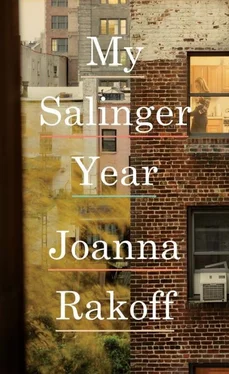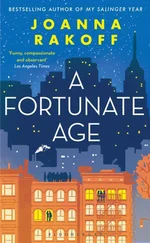By the end of the day, the involved parties had reached a détente, of sorts: Roger agreed to use Salinger’s latest design, which was somewhat unusual, involving his name slanting down the spine on a diagonal. This agreement had not come easily. “Bite it, Roger,” my boss finally said, or so she reported to Hugh and me.
“You didn’t really say that?” asked Hugh, laughing.
“I most certainly did,” confirmed my boss. “This would have gone on forever. It’s just ridiculous. If he’s going to get this book in stores by the New Year”—the pub date was still January 1, though this seemed highly improbable to me and, I knew, to Hugh; we hadn’t even finished working out the contracts—“no one cares what the spine looks like. They’ll buy the book because it’s Salinger.”
“True,” said Hugh. “But it’s Roger’s press. I can see why he wants it to look decent.”
“It will look decent,” said my boss, holding out Salinger’s rendering to him.
Hugh squinted at it. “Wow,” he said. “Can they even do that? Stamp it on the diagonal?”
“Roger’s ordered a sample case, so we’ll see soon enough,” said my boss with a smile that I recognized, belatedly, as utterly wicked.
Sometimes, at lunch, I walked through Rockefeller Center and glimpsed Jenny’s old building, a wash of sadness spreading through me. She was no longer inside, e-mailing her colleagues about lunch; she was in Cleveland. Though I rarely saw her when she worked just across town—her life, her world, had been so separate from mine—it comforted me to know she was there, a few blocks west. There was the hope, I supposed, that things would change, go back to the way they were.
She and Brett had rented not a house but an apartment near the university—real estate in Cleveland was not, it turned out, as cheap as they’d thought—and she had found a job, a part-time job, at the science museum, as an educator, which meant she was one of the cheerful, sweet-natured docent-like people who brought kids to the discovery center—or whatever it was called in Cleveland—to observe ant farms and run their fingers along dinosaur bones and who knows what else, all the things we had done as kids at the Museum of Natural History. It was, I told her over the phone, the perfect job for her, relieved to be able to tell her the simple truth.
After I hung up, though, I thought about Holden, of course. Like the boy from Winston-Salem, I was starting to think about Holden a lot. Holden loved the Museum of Natural History, too, the Indians and the deer drinking from the artificial pond and the birds migrating south in a V. “The best thing, though,” he says, “…was that everything always stayed right where it was. Nobody’d move.” Those Indians, that deer, the birds in flight, they remain utterly the same. “The only thing that would be different would be you .”
One day my boss handed me a story by a client of hers of whom I’d heard nothing. He was elderly, I gathered, and had published a few acclaimed novels in the distant past, but these novels were long out of print and his name was all but lost to the channels of history. Certainly, it rang no bells with me. Later, I would look for his novels on the Agency’s shelves but find none. “Why don’t you send this out?” she said.
“Under my own name?” I asked tentatively, certain she would say no. Uncertain as to whether I even wanted her to say yes.
“Yes,” she said. “Of course.”
The story was good. Good, but quiet, in the parlance of the Agency—which also favored the term “edgy” to describe anything, it seemed, with graphic sex, like the work of some of Max’s clients—in that it wasn’t particularly plot-driven. But neither were many stories, including Salinger’s. It read more like a visitation with a character.
In this day and age, I knew, this story was not, most likely, for the big magazines. But sometimes the unlikely occurred. Sometimes The New Yorker ran stories translated from Urdu or written entirely without the letter e . Sometimes it, too, ran stories that were merely quiet. The magazine had a new fiction editor, I knew, and he would surely be looking for new writers. I typed up a cover letter, clipped it to the story, and sent it off, into the world.
That afternoon, James sent Don’s novel out. He was, of course, an Agency Type of Person, so he would not be holding an auction for the book, but would instead send it to one editor at a time. “If it were a big book,” he told me, “I’d do an auction.” Maybe James was right. We just needed one person to see the strange grandeur in Don’s writing, to see, too, how it might be unpacked, loosened, lightened, his story ordered and trimmed. Just one person.
I wondered, though, if holding an auction might signal to editors that this was an important novel. If an auction might make it a big book.
No, I thought, as I watched Izzy, the messenger, depart with the manuscript, his slicker ballooning over his gaunt form, no, that had been up to Don.
I’d grown used to the quiet of our wing without my boss, grown used to mapping out my own time, and for those first few days following her return I had to force myself not to regard her as an interloper, an intrusion on my calm, peaceful workday. All the more so when the shouting began. We had all been treading delicately around her—with good reason—so I was shocked when, one afternoon, I heard Max raise his voice in her office. The door was closed, so I had no idea what he was yelling about—something he regarded as “bullshit” and “not acceptable”—and I froze in my chair, unable even to type.
I was saved by the phone, out of which emanated a pleasant English accent. “Is this Joanne?” it asked.
“It is,” I confirmed.
The caller explained that she was the assistant to The New Yorker ’s new fiction editor and she was calling about the story I’d sent. My heart began to beat faster. I’d been expecting a note. This was how rejections usually came. Perhaps they were going to take it? Could this be possible?
“We’re going to have to pass on it, I’m afraid,” she said with a huge yawn. “Sorry, I have terrible jet lag. I can’t get used to the time change. I’ve been here for ages, but I still wake up ridiculously early and fall asleep at six o’clock.”
From my boss’s office, the shouting had subsided. Max burst out the door. “All right,” he said, shaking his head in exasperation, as he walked away, studiedly not glancing in my direction. My boss sighed and slowly followed him, surely going off to talk to Carolyn.
“Listen, the reason I’m calling is because we really liked this story. If the author has any others, please send them. And please do stay in touch. Send us more.” She yawned again, less dramatically. “It was close.”
This pleased me more than it should have. I was close. I had aimed high and almost made it.
Don was close, too. Sort of. A few days later, James strolled over to my desk and held a letter up to me. “First rejection,” he explained with a huge grin. “And it’s a really great one.” I had worked at the Agency long enough to understand that there were rejections and there were rejections. There was not for me and I just didn’t find these characters sympathetic and the story struck me as improbable at best , and also simply I’m afraid this is too similar to a novel we’re publishing next fall or too similar to a writer already on our list . And then there was I truly loved the writing but I just didn’t feel the story hung together and I’m so torn about this novel and I’d love to see this writer’s next novel , which was essentially the gist of the note James held in his hand.
Читать дальше












